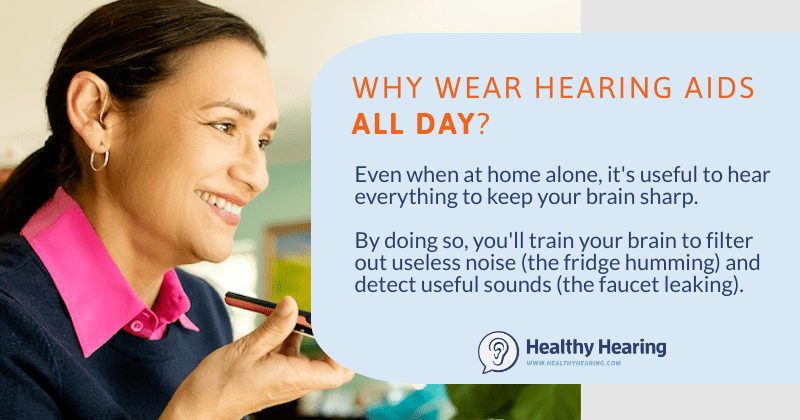If you have hearing aids, you may wonder how often you need to wear them to get the most benefit.
To keep both your hearing and brain sharp, you should wear your hearing aids all day. The only time you should remove your hearing aids is for sleeping and activities like showering or swimming since most hearing aids are not waterproof.
If you're new to hearing aids, this can be challenging at first. Your hearing care provider may recommend wearing them for a few hours each day, at least initially. Here are more tips for getting used to new hearing aids.

How many hours a day should you wear hearing aids?
To find out how many hours a day you should wear your hearing aids for maximum benefit, I spoke with Catherine Palmer, president of the American Academy of Audiology, a professor at the University of Pittsburgh and director of audiology for its health system.
Though there’s not a specific number, Dr. Palmer told me that people who wear their aids all through their waking hours do better.
"The brain isn’t good at trying to listen in two ways—through the hearing loss and through the amplification system. The ear is a doorway to the brain, it doesn’t make sense to have it partially closed part of the day,” she explained.
When you take out your hearing aids for prolonged periods, you may feel that it’s harder to hear than it used to be. The difference is the amount of energy your brain puts into hearing. You’ve adapted to a hearing-aid world and your brain doesn’t work as hard at compensating for your hearing loss as it did before.
"The ear is a doorway to the brain, it doesn’t make sense to have it partially closed part of the day."
Hearing loss subjects your brain to auditory deprivation
Most people with hearing loss struggle to hear sounds at different frequencies, usually high ones. If you don’t treat your hearing loss your brain may forget how to hear certain words and sounds. This is known as auditory deprivation.
Imagine a baby who doesn't have the ability to hear. “If hearing and speech and language are the parents’ goal, we need to get stimulation to the auditory nerve quickly because neural synapses are developing,” explains Dr. Palmer.
"This is an issue for adults as well. We don’t want the auditory system deprived of sound because over time that can change auditory processing abilities,” she said.
Sporadic use of hearing aids may lead to a similar type of deprivation. If you take them off for any length of time during the day, your brain will adjust to the new conditions and you’ll either use more effort to hear or withdraw from communication. Both can negatively affect your ability to process certain sounds.
Wearing hearing aids regularly speeds up adjustment phase
Many new hearing aid users go through an adjustment period when first wearing their devices. Sounds that they haven't heard in awhile may sound overly loud, or even sharp or tinny. However, the more consistently you wear your hearing aids, the faster you will get through the adjustment phase and the better your hearing will be.
When to see an audiologist
If you begin wearing your aids again and the sound isn’t comfortable, you may need some time to adjust. If that doesn't work, see an audiologist or hearing instrument specialist. Hearing needs can change over time for anyone. An audiologist can reprogram your hearing aids if needed, and help motivate you to use your hearing aids full-time.




 Emily is an experienced journalist and medical content writer based in Maine. Passionate about delivering enlightening and accurate content, she is committed to empowering people to make informed choices regarding their hearing health.
Emily is an experienced journalist and medical content writer based in Maine. Passionate about delivering enlightening and accurate content, she is committed to empowering people to make informed choices regarding their hearing health.